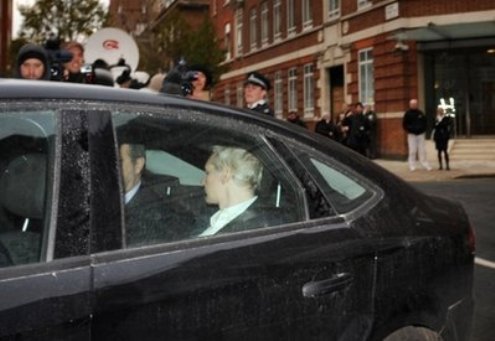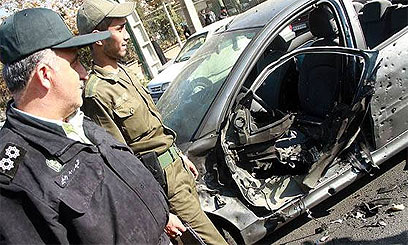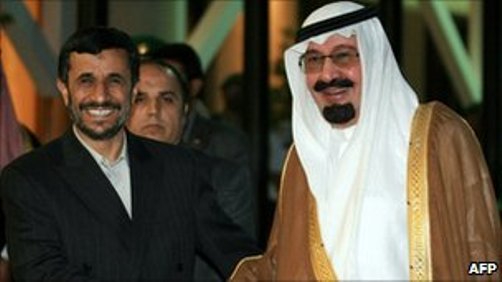
WikiLeaks founder Julian Assange, back to camera, is driven into Westminster Magistrates Court in London Tuesday Dec. 7, 2010 after being arrested on a European Arrest Warrant. Assange is appearing at the court for his extradition hearing for sexual assault allegations in Sweden.(AP Photo/ Stefan Rousseau/PA)
Please also visit : INDONESIAKATAKAMI.WORDPRESS.COM
A month after dropping out of public view, the 39-year-old Australian surrendered to Scotland Yard to answer a warrant issued for his arrest by Sweden. He is wanted for questioning after two women accused him of having sex with them without a condom and without their consent.
Assange said he would fight extradition to Sweden, setting the stage for what could be a pitched legal battle. And as if to prove that it can’t be intimidated, WikiLeaks promptly released a dozen new cables, including details of a NATO defense plan for Estonia, Latvia and Lithuania that made Russia bristle.
The Pentagon welcomed Assange’s arrest.
“That sounds like good news to me,” U.S. Defense Secretary Robert Gates said on a visit to Afghanistan.
WikiLeaks spokesman Kristinn Hrafnsson insisted Assange’s arrest and the decision Tuesday by both Visa and MasterCard to stop processing donations to the group “will not change our operation.” Hrafnsson said the organization has no plans yet to make good on its threat to release en masse some of its most sensitive U.S. documents if it comes under attack.
At a court hearing in London, Assange showed no reaction as Judge Howard Riddle denied him bail while he awaits an extradition hearing Dec. 14. The judge said Assange might flee if released. When the judge asked him whether he would agree to be extradited, Assange said: “I do not consent.”
It was not publicly known which jail Assange was sent to, since British police never reveal that for privacy and security reasons. Some prisoners occasionally get Internet access, though only under close supervision.
The U.S. government is investigating whether Assange can be prosecuted for espionage or other offenses. On Tuesday, Pentagon and State Department officials said some foreign officials have suddenly grown reluctant to trust the U.S. because of the secrets spilled by WikiLeaks.
“We have already seen some indications of meetings that used to involve several diplomats and now involve fewer diplomats,” said State Department spokesman P.J. Crowley. “We’re conscious of at least one meeting where it was requested that notebooks be left outside the room.”
Pentagon spokesman Col. Dave Lapan said the military had seen foreign contacts “pulling back.”
“Believing that the U.S. is not good at keeping secrets and having secrets out there certainly changed things,” Lapan said.
During the hour-long court hearing in London, attorney Gemma Lindfield, acting on behalf of the Swedish authorities, outlined the allegations of rape, molestation and unlawful coercion that were brought against Assange following separate sexual encounters in August with two women in Sweden.
Lindfield said one woman accused Assange of pinning her down and refusing to use a condom on the night of Aug. 14 in Stockholm. That woman also accused of Assange of molesting her in a way “designed to violate her sexual integrity” several days later. A second woman accused Assange of having sex with her without a condom while he was a guest at her Stockholm home and she was asleep.
A person who has sex with an unconscious, drunk or sleeping person in Sweden can be convicted of rape and sentenced to two to six years in prison.
Assange’s lawyers have claimed the accusations stem from disputes “over consensual but unprotected sex” and say the women made the claims only after finding out that Assange had slept with both.
Prosecutors in Sweden have not brought any formal charges against Assange. WikiLeaks lawyer Mark Stephens said there are doubts as to whether Sweden has the legal right to extradite him simply for questioning.
Experts say European arrest warrants like the one issued by Sweden can be tough to beat. Even if the warrant were defeated on a technicality, Sweden could simply issue a new one.
The extradition process could take anywhere from a week to two months, according to Assange’s Swedish lawyer Bjorn Hurtig. If Assange loses, he may appeal to the High Court. There can be further appeals, and Sweden also has a right to appeal if the court finds in Assange’s favor.
In the meantime, Stephens said he would reapply for bail, noting that several prominent Britons — including socialite Jemima Khan and filmmaker Ken Loach — have each offered to post 20,000 pounds ($31,500) so Assange could go free.
Australian government officials said they are providing Assange with consular assistance, as they do with any countryman arrested abroad. The consul general in London spoke to Assange to ensure he had legal representation, the government said.
Some people protested outside the London court, bearing signs reading, “Save Wikileaks, Save Free Speech” and “Trumped Up Charges.”
“I came to show my support for Julian,” said 26-year-old electrician Kim Krasniqi. “He is innocent. Europe is bullying him, They don’t want him to publish what he is publishing.”
The latest batch of confidential U.S. cables could strain relations between Washington and Moscow. The documents show that NATO secretly decided in January to defend the Baltic states of Estonia, Latvia and Lithuania against military attack.
Dmitry Rogozin, Russia’s ambassador to NATO, said Tuesday that Moscow will demand that NATO drop the agreement, which he argued is clearly aimed at his country.
“Against whom else could such a defense be intended? Against Sweden, Finland, Greenland, Iceland? Against polar bears, or against the Russian bear?” Rogozin said. (*)









